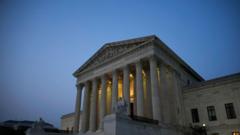The US Supreme Court deliberated on a significant case concerning President Trump's attempt to eliminate birthright citizenship, which currently guarantees citizenship to anyone born in the US. The case focuses on the authority of lower courts to issue nationwide injunctions, as the Trump administration seeks to limit judicial power. Opposition to Trump's order rallying publicly highlights the contentious nature of immigration policy and its implications on tens of thousands of individuals.
US Supreme Court Weighs Trump's Controversial Birthright Citizenship Order

US Supreme Court Weighs Trump's Controversial Birthright Citizenship Order
The Supreme Court hears arguments on President Trump's order to end birthright citizenship amid legal battles and protests.
In a pivotal session on Thursday, President Donald Trump brought his efforts to terminate birthright citizenship to the US Supreme Court, a move that could have substantial repercussions for his immigration policies. The case under scrutiny addresses whether lower court judges have the authority to block presidential directives that affect the entire country, as has occurred in this instance. Justices from both sides of the ideological spectrum appeared divided as they considered the arguments from both parties.
US Solicitor General D John Sauer asserted that lower courts had surpassed their authority in issuing injunctions that halted Trump's order. He proposed that implementing class-action lawsuits could potentially mitigate the need for such broad judicial intervention. Yet, critics, including New Jersey's solicitor general, Jeremy Feigenbaum, voiced strong opposition, emphasizing that supporting Trump's order would result in a chaotic citizenship structure where individuals might possess different citizenship statuses depending on the state they occupy.
The justices engaged intensively with Sauer, particularly questioning the merits of the birthright citizenship order itself. Critics fear that Trump's interpretation of the 14th Amendment could lead to the children of undocumented immigrants being stripped of their citizenship rights. This concern echoes throughout the court's integral discussions on the broader implications of altering the long-established legal framework surrounding birthright citizenship, stating that no variations by state could be permitted.
Outside the courtroom, a significant protest took place, with former House Speaker Nancy Pelosi joining demonstrators opposing Trump's immigration strategies. Pelosi emphasized the constitutional implications of the birthright citizenship debate.
As the justices grappled with arguments over the authority of lower courts and the constitutional validity of Trump's order, it remains uncertain when the court may reach a verdict. The Trump administration's quest to assert greater executive power and navigate around judicial checks continues to incite discussions regarding the foundational principles of citizenship and due process in the United States.
Legal experts maintain that Trump’s presidential authority may not extend to altering the birthright citizenship granted by the 14th Amendment. The administration’s plans to reinstate executive policies are fraught with complexities, subject to further legal challenges irrespective of a ruling from the Supreme Court.
As this landmark case unfolds, it raises critical questions about citizenship rights, the scope of presidential power, and the potential societal impacts on countless American families, highlighting the ongoing national debate surrounding immigration and identity in modern America.
US Solicitor General D John Sauer asserted that lower courts had surpassed their authority in issuing injunctions that halted Trump's order. He proposed that implementing class-action lawsuits could potentially mitigate the need for such broad judicial intervention. Yet, critics, including New Jersey's solicitor general, Jeremy Feigenbaum, voiced strong opposition, emphasizing that supporting Trump's order would result in a chaotic citizenship structure where individuals might possess different citizenship statuses depending on the state they occupy.
The justices engaged intensively with Sauer, particularly questioning the merits of the birthright citizenship order itself. Critics fear that Trump's interpretation of the 14th Amendment could lead to the children of undocumented immigrants being stripped of their citizenship rights. This concern echoes throughout the court's integral discussions on the broader implications of altering the long-established legal framework surrounding birthright citizenship, stating that no variations by state could be permitted.
Outside the courtroom, a significant protest took place, with former House Speaker Nancy Pelosi joining demonstrators opposing Trump's immigration strategies. Pelosi emphasized the constitutional implications of the birthright citizenship debate.
As the justices grappled with arguments over the authority of lower courts and the constitutional validity of Trump's order, it remains uncertain when the court may reach a verdict. The Trump administration's quest to assert greater executive power and navigate around judicial checks continues to incite discussions regarding the foundational principles of citizenship and due process in the United States.
Legal experts maintain that Trump’s presidential authority may not extend to altering the birthright citizenship granted by the 14th Amendment. The administration’s plans to reinstate executive policies are fraught with complexities, subject to further legal challenges irrespective of a ruling from the Supreme Court.
As this landmark case unfolds, it raises critical questions about citizenship rights, the scope of presidential power, and the potential societal impacts on countless American families, highlighting the ongoing national debate surrounding immigration and identity in modern America.





















